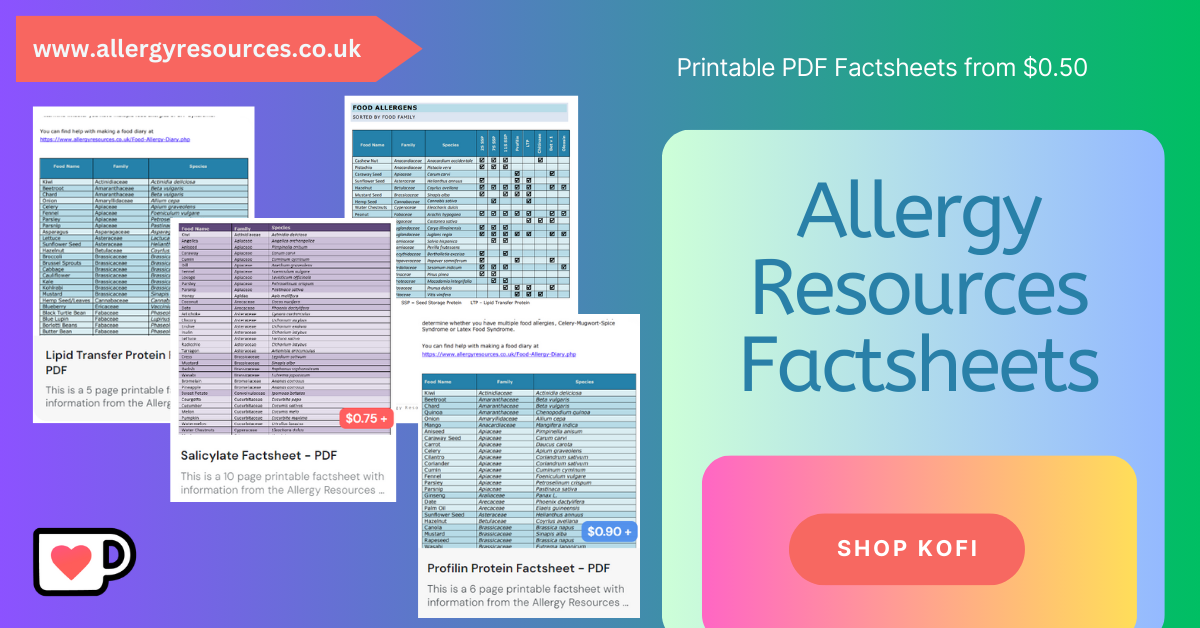
LATEX FOOD SYNDROME
Key Allergens
There are 15 allergens associated with allergy to latex plants. The plant involved in latex allergy Hevea brasiliensis , the rubber tree plant, have allergens called Hev b 6 which is a hevein and Hev b 11 which is a chitinase. These are the most likely culprits for severe latex allergy
Chitinase is the protein thought to cause most instances of Latex Food Syndrome.
Hevein is a related protein and may also have some role in the Latex Food Syndrome.
Hev b 8 in the rubber tree plant is a profilin protein. Those very sensitised to latex may have a contact allergic reaction from other foods or plants containing profilin proteins, there is less evidence of this than sensitisation to other latex linked proteins like hevein and chitinases, but it still has an important role in Latex Food Syndrome.
Cross Reactivity
Chitinase allergens can also affect the airways and can be found in coffee, cockroaches and dust mites.
Hevein proteins are found in rubber trees (as a contact allergen) and in turnip (as a food allergen).
Profilin proteins are found in many foods including, in the top 14 foods, celery, peanut, soyabeans, walnut, lupin, almonds, mustard and hazelnut all contain profilin proteins.
Fruits and vegetables containing these proteins are kiwi, pineapple, chilli, melon, orange, strawberry, lychee, apple, banana, aubergine (eggplant), peach, pear, tomato, dates, cherry and carrot.
Profilin proteins are also found in barley, sorghum and wheat.
These food lists are not exhaustive, the most up to date information is available on the Cross Reactivity Tool.
You can download a Latex Food Syndrome Factsheet from the Allergy Resources Ko-fi Shop for just $0.90 (£0.69 or €0.82). This has up to date information on which foods contain latex linked allergens and what to avoid if you think you have Latex Food Syndrome.
Resources
Websites
Allergen Encyclopedia - Latex Allergy
Allergy Asthma Network - Latex Allergy
Latex-Fruit Syndrome and Class 2 Food Allergy
Articles and Journals
Anaphylaxis after Avocado ingestion in a patient located in the Rio Grande Valley, 2024
Molecular Basis of Plant Profilins’ Cross-Reactivity, 2023
Avocado allergy. Identification of a new allergen, 2022
Jackfruit Anaphylaxis in a Latex Allergic Non-Healthcare Worker, 2021
Natural rubber latex allergy, 2021
Symptoms and awareness of latex allergy among healthcare workers, 2020
Latex-fruit syndrome in Italian children and adolescents with natural rubber latex allergy, 2013
Diagnosis of latex allergy: the importance of hev B 11, 2012
Allergens and natural rubber proteins, 2002
Class I chitinases as potential panallergens involved in the latex-fruit syndrome, 1999
Latex allergy: clinical features and cross-reactivity with fruits, 1994